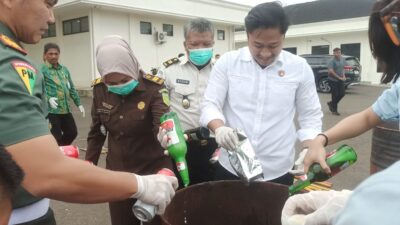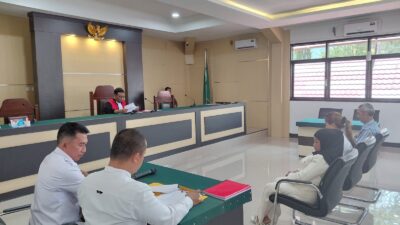KLIK24.NEWS – Loyalty Pledge to Always Walk Together, The Directorate General of Taxes (DJP) once again faces a test due to the widely publicized case of Mario Dandy, the son of an official within the institution, who was subjected to a disturbing act of violence. It is impossible not to be emotionally affected by the circulation of abuse video, and as a result, the name of this institution is repeatedly mentioned in media.
This sentiment is difficult to avoid as the institution’s task is inherently unpopular since taxation reduces individuals’ wealth. It requires clear and objective thinking to assess this case since it involves pure abuse and violence against a child, rather than a tax employee misconduct scandal like the viral case of Gayus Tambunan, which once tarnished the credibility of the Tax Institution.
Maintaining trust in this institution is crucial as it directly affects tax revenue, which is the backbone of national income. DJP has a tax revenue target of 1,718 trillion rupiahs for this year, a 16% increase compared to the previous year’s target. This figure accounts for 70% of the country’s revenue target, emphasizing the importance of maintaining trust and convincing the public to comply with tax obligations.
If tax revenue falls short, it will increase the state budget deficit, potentially leading to increased national debt or the government being forced to reduce essential state expenditures for development and as an economic catalyst. Ultimately, it is the people who will suffer. Conversely, when tax revenue exceeds the target, the surplus will assist the government, for instance, in gradually reducing the growing national debt resulting from the impact of the COVID-19.
BACA JUGA : Wali Kota, Ir. Hj. Tatong Bara Terima Kunjungan Kerja Inspektur Jenderal Kementerian Pertanian
After a long wait of 12 years, the institution has finally surpassed the tax revenue target in 2021 and 2022. Similarly, as of April 2023, monthly tax revenue shows a positive growth of 21.3% compared to the previous year, equivalent to 40.05% of the 2023 state budget target. This achievement indicates that our economy is starting to recover, and it is crucial for the government not to lose momentum in maintaining economic stability amidst global uncertainties.
Tax as an Economic Stability Catalyst
What is our tax money used for? Referring to the APBN 2023, for every one million rupiahs of tax we paid, approximately Rp.295,600 is allocated to public services, Rp.282,000 to the economy, Rp.107,300 to social protection, Rp.104,200 to education, Rp.81,300 to security, Rp.59,800 to defense, Rp.43,000 to healthcare, and the others. From this allocation, the benefits of taxation can be directly or indirectly experienced through leverages and multiplier effects.
Some direct benefits are tangible to the public include free education and healthcare, fuel and electricity subsidies, government social assistance, salaries for civil servants, military, and police personnel, and the extensive development of road infrastructure. For example, Papua has greatly benefited from road development since 2014, addressing the major challenge of interregional connectivity isolation. During the inauguration of the Papua Youth Creative Hub on March 21, 2023, President Jokowi announced the construction of the Trans-Papua road spanning 3,462 kilometers and 1,098 kilometers of border roads.
On the other hand, indirect benefits of taxation can be seen in how the multiplier effect of road infrastructure development improves interregional connectivity, reduces travel time, lowers logistics costs, decreases commodity prices, facilitates product marketing for businesses, and fosters the emergence of new economic centers in different regions. This is a concrete manifestation of taxation as an economic catalyst.
BACA JUGA : Wali Kota Kotamobagu, Ir. Hj. Tatong Bara Hadiri HUT ke – 73 GMIBM Bersinode
The economic storm caused by the pandemic may have subsided, and economic recovery is showing positive trends. It is now time to safeguard Indonesia’s economic stability. The presence of taxation as a regulator is expected to contribute to maintaining economic stability through tax regulations and policies that have positive effects. The enactment of two recent tax acts, Cipta kerja Act and the HPP Act, brings significant changes to income tax regulations and taxpayer-friendly penalties.
Income tax remains the largest source of tax revenue (54.4% of the tax target), but the government has made significant reductions from this tax. The corporate income tax rate has been lowered from 25% to 22%, and for publicly listed companies with certain conditions regarding public ownership, the rate is 19%. This serves as a OASE for businesses that are recovering from the pandemic’s impact. Other tax incentives, such as tax holidays for new investors, particularly in the downstreaming of industries, have become catalysts for tremendous growth in foreign investment. Furthermore, tax holidays also benefit the lower-middle class, as UMKM with an annual turnover of up to 500 million rupiahs are exempt from taxes.
Additionally, the 10% income tax on dividends received by individuals has been abolished with the condition that the dividends are reinvested in Indonesia for a period of 3 years. This will increase funds parked in Indonesia, enhancing the circulation of money and domestic investment. Reviving business enthusiasm and increasing investment will generate job opportunities and new economic centers, thereby reducing unemployment rates and improving people’s purchasing power.
Similarly, the realm of tax penalties has undergone significant changes, with a decrease in the late payment interest rate from 2% to below 1% and other reduction penalties. This represents the initial steps toward maturity in the field of taxation. Just like parents raising their children, different disciplinary techniques are used for a child’s mistakes when they are young versus when they become adults. We are undergoing such a process of maturation in line with ongoing tax reforms promoted by DJP through effective awareness raising and taxpayer compliance through education and supervision. However, the institution must maintain its credibility by enforcing strict law enforcement without favoritism when dealing with tax evaders who continue to defy the rules. This aligns with the Slippery Slope Theory, which asserts that tax compliance arises from two factors: the power of authorities and trust in authorities.
Taxation and economic stability are inseparable partners. When one is ailing, the other supports and strengthens it. They have pledged loyalty to one another and will always walk together in anticipation of Indonesia’s Golden 2045.




 .
.
 .
.














